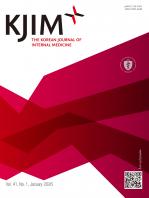|
Hemato-oncology / Original Article
Characteristics and treatment patterns in older patients with locally advanced head and neck cancer (KCSG HN13-01)
Eun Joo Kang, Yun-Gyoo Lee, Bhumsuk Keam, Jin-Hyuk Choi, Jin-Soo Kim, Keon Uk Park, Kyoung Eun Lee, Hyo Jung Kim, Keun-Wook Lee, Min Kyoung Kim, Hee Kyung Ahn, Seong Hoon Shin, Jii Bum Lee, Jung Hye Kwon, Hye Ryun Kim, Sung-Bae Kim, Hwan Jung Yun
Korean J Intern Med. 2022;37(1):190-200. Published online December 21, 2021
Background/Aims: Treatment decisions for locally advanced head and neck squamous cell carcinoma (LA-HNSCC) are complicated, and multi-modal treatments are usually indicated. However, it is challenging for older patients to complete treatments. Thus, we investigated disease characteristics, real-world..
|
|
|
Pulmonology / Original Article
Clinical efficacy of adjuvant chemotherapy in stage IB (< 4 cm) non-small cell lung cancer patients with high-risk factors
Juwhan Choi, Jee Youn Oh, Young Seok Lee, Kyung Hoon Min, Jae Jeong Shim, Sue In Choi, Dong Won Park, Chan Kwon Park, Eun Joo Kang, Hwan Seok Yong, Bong Kyung Shin, Hyun Koo Kim, Sung Yong Lee
Korean J Intern Med. 2022;37(1):127-136. Published online July 29, 2021
Background/Aims: Adjuvant chemotherapy is the standard of care for resected stage II-IIIA non-small cell lung cancer (NCSLC). The efficacy of adjuvant chemotherapy in stage IB (< 4 cm) NSCLC with high-risk factors is controversial.
Methods: This retrospective multicenter study included 285 stage IB..
|
|
|
Hemato-oncology / Original Article
Impact of subsequent chemotherapy on the survival of elderly patients with extensive stage small cell lung cancer
Eun Joo Kang, Yoon Ji Choi, Se Ryeon Lee, Hwa Jung Sung, Jung Sun Kim
Korean J Intern Med. 2020;35(6):1468-1476. Published online April 29, 2020
Background/Aims: The prognosis of small cell lung cancer (SCLC) is still poor because of rapid recurrence, despite good response to initial chemotherapy. Additionally, patients’ old ages and comorbidities are often obstacles that make it difficult to apply subsequent treatment after initial treatm..
|
|
|
Hemato-oncology / Original Article
The role of platelet function analyzer-200 in predicting perioperative bleeding risk
Eun Sang Yu, Min Ji Jeon, Ka-Won Kang, Byung-Hyun Lee, Eun Joo Kang, Yong Park, Se Ryeon Lee, Hwa Jung Sung, Chul Won Choi, Byung Soo Kim, Dae Sik Kim
Korean J Intern Med. 2020;35(5):1199-1209. Published online February 6, 2020
Background/Aims: Various preoperative screening tests, such as platelet count, prothrombin time, activated partial thromboplastin time, and bleeding time, have been widely used to evaluate the risk of bleeding during surgery. Use of platelet function analyzer (PFA)-100/200 for assessing platelet fun..
|
|
|
Hemato-oncology / Original Article
Inflammatory markers as prognostic indicators in pancreatic cancer patients who underwent gemcitabine-based palliative chemotherapy
Hong Jun Kim, Suk-young Lee, Dae Sik Kim, Eun Joo Kang, Jung Sun Kim, Yoon Ji Choi, Sang Cheul Oh, Jae Hong Seo, Jun Suk Kim
Korean J Intern Med. 2020;35(1):171-184. Published online October 26, 2018
Background/Aims: Patients with pancreatic cancer (PC) generally have poor clinical outcomes. Early determination of their prognosis is crucial for developing a therapeutic strategy. Recently, various inflammatory markers have been validated as prognostic indicators for many cancers, including PC. Ho..
|
|
|
















